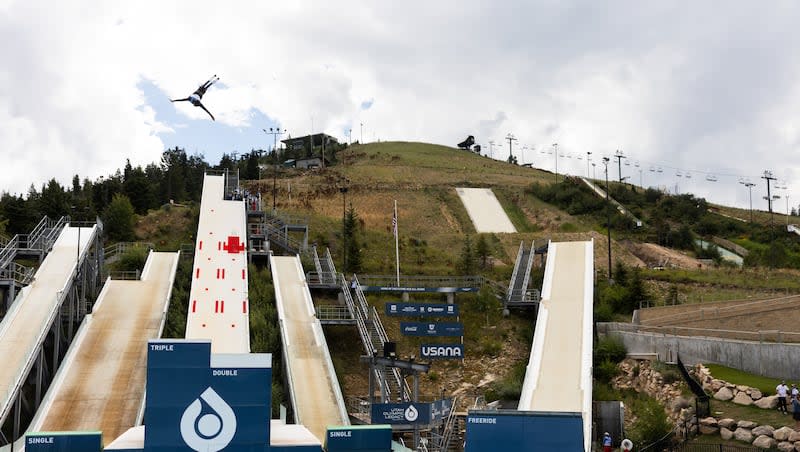Here’s how Utah’s Olympic bid was pitched to the world’s winter sports federations

Utah’s Olympic bidders pitched what they called “a compelling and sustainable plan” for a 2034 Winter Games to leaders of the world’s winter sports federations in a virtual presentation Tuesday.
“Our ability today to showcase proven and experienced venues for every sport — all within an hour of the Athlete Village — is a strong selling point for Utah to the winter sport federations,” Colin Hilton, president and CEO of the Utah Olympic Legacy Foundation that oversees a number of 2002 Winter Games sites that would be used for another Olympics, said.
Hilton and other members of the Salt Lake City-Utah Committee for the Games spent about an hour online with the seven international sports organizations that make up the Winter Olympic Federations, the latest step in the International Olympic Committee’s new, less formal selection process that saw Salt Lake City named the preferred host for 2034 late last year.
In April, members of the IOC’s Future Host Commission traveled to Utah to tour the proposed venues. The commission, which includes IOC members and sports representatives, is set to report on their findings to the IOC Executive Board in June. It will be up to that board whether there’s a final vote by the full IOC membership in July, ahead of the 2024 Summer Games in Paris.
Tuesday’s virtual presentation was largely technical and not shared publicly, but Hilton told the Deseret News “they didn’t really have a ton of questions for us, mostly just comments and appreciation for all of what has been going on” at the venues in the decades since Utah’s last Olympics.
What was asked by the presidents and secretaries general of the federations over biathlon, bobsled and skeleton, ice hockey, luge, skating, and skiing and snowboarding were “mostly clarifying questions,” Hilton said, including about venue capacity and what specific international events have been held.
“I wouldn’t say there were any surprises,” he said, calling the sports officials “very complimentary of how we have maintained and kept in vibrant uses the facilities.” The legacy foundation owns the Utah Olympic Park near Park City that’s the site of the sliding track and ski jumps, and also operates the Utah Olympic Oval in Kearns and the Soldier Hollow Nordic Center near Midway.
Back in 1989, Utah voters passed a nonbinding referendum backing a Winter Games bid that resulted in the state spending $59 million to build Olympic facilities. Taxpayers were repaid by organizers of the 2002 Winter Games, who also established an endowment to keep the facilities running.
In recent years, the Utah Legislature has appropriated nearly $92 million to the venues, which are used by both community and elite athletes. In addition to the venues built for the Games, 2034 competitions would be held at several ski resorts as well as at facilities in Provo and West Valley City, with a a temporary big air ski and snowboard jump set to be built in downtown Salt Lake City.
Besides venues, Tuesday’s pitch also touched on the bid committee’s vision for a 2034 Olympics in Utah, Hilton said, including plans to add the first-ever housing for athlete families at the University of Utah, where student dormitories would once again be the Games-time home to thousands of athletes from around the world.
Salt Lake City Mayor Erin Mendenhall talked about the “welcoming and diverse community” in Utah’s capital city as well as the widespread public and political support for the bid, Hilton said. A Deseret News/Hinckley Institute of Politics poll in 2023 found that more than 80% of Utahns want to host another Olympics.
Park City Mayor Nann Worel also participated in the presentation, telling them about the ski resort community’s winter sports culture and long history of hosting skiing world cups dating back to the America’s Cupin the mid-1980s, he said, as well at its sister city relationship with Courchevel, part of France’s French Alps bid, the IOC’s preferred host for the 2030 Winter Games.
The virtual meeting marked the first time some of the winter sports federation had heard specifics about Utah’s bid, Hilton said, even though athletes from nearly 30 countries come to Utah annually to train and compete. He said Tuesday served as “a confirmation of a mutual desire to partner together to grow winter sport over time.”
Austria IOC member Karl Stoss, who heads the Future Host Commission, joined the call along with several members of the IOC staff. Hilton said Stoss talked about how much the commission “enjoyed seeing actively used venues that had a level of programming” that is helping to develop winter sports.
The IOC told the Deseret News that “any feedback from the international federations” about Tuesday’s presentation “will be taken into consideration by the Future Host Commission for the Olympic Winter Games in the preparation of its report to the IOC Executive Board” next month.
If the IOC leaders advance Utah’s bid, the final vote of the full membership is expected in Paris on July 24, celebrated in Utah as Pioneer Day.

